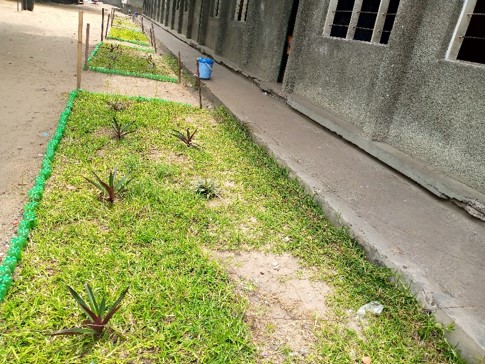A Letter from José LaMont Jones, serving in the Democratic Republic of Congo
Spring 2023
Write to José LaMont Jones
Individuals: Give to E132192 in honor of José Jones’ ministry
Congregations: Give to D500115 in honor of José Jones’ ministry
Churches are asked to send donations through your congregation’s normal receiving site (this is usually your presbytery)
Subscribe to my co-worker letters
Dear friends,
Directrice Antho Lutumba, principal of EPP Masina, located in Kinshasa, the capital of the Democratic Republic of Congo, believes that providing a clean, safe school environment helps build self-esteem and is important to the success of her school. EPP Masina is one of the elementary schools established and run by the Presbyterian Community of Kinshasa (CPK). EPP Masina has earned the distinction of having 100 percent of its sixth grade students passing the national exams to enter the secondary level for years!

Needs assessment meeting with Principal Antho Lutumba in Sept. 2022 (Photo credit: Jean Barnabas).
In discussing the needs of the school, she lifted up three things she believed would enhance the students’ ability to learn. The first was to repair the entrance to the school, which was unevenly and inappropriately sloped and a potential danger for falls. Having nearly slipped on the sand that made the slope more dangerous, I was 100 percent in agreement! Since there is no budget for repairs, I donated the necessary amount to the school because I knew I would feel awful if a student got hurt.
The second need was to plant flowers. Flowers would beautify the campus and could also be used to enhance the curriculum on plant growth and structure. The easiest solution, and the one we implemented, was to gather some of the plants that grow by the side of the road to beautify the green spaces.

Discussing the beautification plan with Principal Antho Lutumba in Dec. 2022 (Photo credit: Evelin Jones).
The third need was more extensive. With a class size of more than 100 students, the school needs more classroom space so students can be divided into multiple classes. When I began to work with EPP Masina in September of 2022, I noticed how quiet the elementary classrooms were despite the large number of students! EPP Masina shares space with two secondary schools; one that meets in the morning and one that meets in the afternoon. The behavior of the seventh and eighth grade secondary students was, sadly, markedly different from the elementary students’ behavior and the classes used to quickly become littered with paper, water bottles and trash.
Directrice Lutumba’s theory is that having a clean, ordered environment lifts the students out of any disorder that may be in their lives and reinforces the understanding that study time is special. To create a sense of order and beauty she sectioned off five islands of grass that are the only green spaces on the campus.
Recently, the older students’ attitudes have changed. Seeing the green spaces fill with plants and being invited to share in the beautification of their campus has led to increased respect for the school environment. Students have not only come to appreciate their school more but have joined in to help transform and care for it. The next phase, now that the “anchor” plants are in, will be to plant ground-cover flowers to cover the grass. These flowers have been propagated from roadside clippings and will add both color and erosion control to the grounds.

Planting areas in Jan. 2023. Notice the use of recycled bottles as edging material (Photo credit: José Jones).
The language teachers have been asked to have the students use these spaces as creative writing themes and the director of studies has been invited to “dream” about how these spaces can be used as curriculum aids. Conversations between all three principals have been encouraged on how to train students to care for the space they all share and be more conscious about how they dispose of trash.
A serious environmental challenge in Kinshasa is plastic water bottle disposal. Because plumbed, potable water is still hard to come by, people buy bottled water BUT often drop the bottles in the drainage or runoff troughs; creating flooding problems when it rains. I am working on ways to build trash cans and a process for removing the waste in a way that does not create health problems for the students in class or harm the environment (i.e. burning waste on school grounds).
Trash cans and this more effective method for disposal of trash will follow while the curriculum is simultaneously developed around using this space as a teaching aid. Finally, setting up community recycling bins is planned for the school (and each of the schools under my purview) as a measure for flood prevention.
There are spiritual lessons in mission and partnership to be learned in this project. First and foremost, is to realize how an unorganized environment could be a symptom of low self-esteem and mental well-being caused by multiple attacks on the spirit by hunger and poverty, which, in turn, cause environmental degradation and health problems.
Secondly, utilizing local talent and wisdom, we have been able to walk alongside our partner and create cost-effective projects that change schools in a positive way. Listening, self-examining pre-determined ideals, and forming learning communities are the attributes of this “best-practice” that we will now teach to others. Will you join with us?
José
![]() You may freely reuse and distribute this article in its entirety for non-commercial purposes in any medium. Please include author attribution, photography credits, and a link to the original article. This work is licensed under a Creative Commons Attribution-NonCommercial-NoDeratives 4.0 International License.
You may freely reuse and distribute this article in its entirety for non-commercial purposes in any medium. Please include author attribution, photography credits, and a link to the original article. This work is licensed under a Creative Commons Attribution-NonCommercial-NoDeratives 4.0 International License.
Tags: beautification, congo, education, environment, Jose Lamont Jones
Tags: Jose LaMont Jones